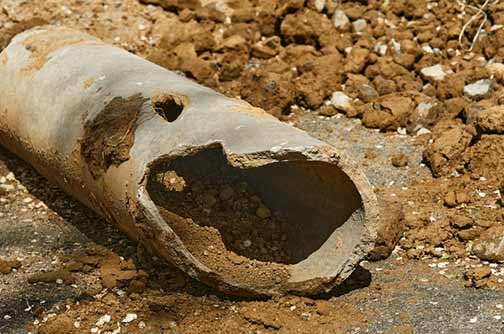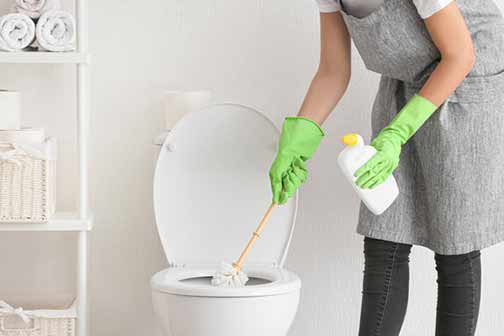
Sewage odors can be both unpleasant and concerning, indicating potential issues in your home’s plumbing system. Identifying the root cause of these odors is the first step towards eliminating them. There are several common causes for sewage odors in homes, and understanding these can help you address the problem effectively.
Common causes of sewage odors include dry P-traps, ventilation issues, broken or cracked sewer lines, and improperly installed or damaged plumbing fixtures. Each of these issues can lead to the infiltration of sewer gases into your home, creating a foul smell that can be both distressing and unhealthy. Below we will explore each of these causes in detail and provide solutions to help you maintain a fresh living space.
The Role of Dry P-Traps in Sewage Odors
One of the most frequent culprits behind sewage smells is a dry P-trap. P-traps are U-shaped pipes found under sinks, showers, and other plumbing fixtures. They are designed to hold water, which acts as a barrier to prevent sewer gases from entering your home. However, if a P-trap dries out, it loses its ability to block these gases, leading to unpleasant odors.
Dry P-traps are often found in rarely used fixtures, such as guest bathrooms or laundry room sinks. To prevent this issue, periodically run water through all your plumbing fixtures to ensure the P-traps remain filled with water. If you suspect a dry P-trap is causing the odor, simply pouring water down the drain can usually resolve the problem.
In addition to running water through fixtures, you can also use a mixture of water and bleach to clean and disinfect the P-traps. This can help remove any buildup that may contribute to odors. Regular maintenance and cleaning of P-traps are essential for preventing sewage smells and maintaining a fresh living environment.
Ventilation Issues and Their Impact on Sewage Smells
Proper ventilation is crucial for maintaining a fresh and odor-free home. Ventilation pipes, also known as vent stacks, allow sewer gases to escape safely outside. When these pipes become clogged or damaged, the gases can be forced back into your home, causing foul odors.
Common causes of ventilation issues include debris, animal nests, or ice blockages in the vent pipes. Regularly inspecting and cleaning your vent stacks can help prevent these problems. If you notice persistent sewage odors despite your efforts, it may be necessary to call a professional plumber to inspect and repair the ventilation system.
In some cases, improving the overall ventilation in your home can also help reduce sewage odors. This may involve installing additional vent pipes or upgrading your existing ventilation system. A professional plumber can assess your home’s ventilation needs and recommend the best solutions to ensure proper airflow and odor control.

Broken or Cracked Sewer Lines: A Serious Concern
Another potential cause of sewage odors is damaged sewer lines. Cracks or breaks in the sewer lines can allow sewage to leak into the surrounding soil, creating a persistent and unpleasant smell. This issue is more common in older homes with aging plumbing systems, but it can occur in newer homes as well.
Signs of a damaged sewer line include slow drains, frequent clogs, and wet spots in your yard. If you suspect a broken sewer line, it is essential to contact a professional plumber immediately. Repairing or replacing damaged sewer lines is a complex task that requires specialized equipment and expertise.
Preventing sewer line damage involves regular inspections and maintenance. A professional plumber can use advanced techniques, such as sewer video camera inspections, to identify potential issues before they become serious problems. By addressing sewer line damage promptly, you can prevent sewage odors and maintain a healthy living environment.
Improperly Installed or Damaged Plumbing Fixtures
In some cases, sewage odors may be caused by improperly installed or damaged plumbing fixtures. For example, a poorly sealed toilet base can allow sewer gases to escape into your home. Similarly, damaged gaskets or seals in sinks, showers, and other fixtures can lead to unpleasant smells.
To address this issue, inspect your plumbing fixtures for signs of wear or damage. Ensure that all seals and gaskets are in good condition and properly installed. If you are unsure about the installation or condition of your fixtures, it is best to contact a professional plumber for assistance.
Regular maintenance and inspection of plumbing fixtures are essential for preventing sewage odors. By addressing any issues with seals and gaskets promptly, you can ensure that your plumbing system functions properly and maintains a fresh living space.
Effective Solutions for Eliminating Sewage Odors
Once you have identified the cause of the sewage odors in your home, it is time to take action. Here are some effective solutions to help you eliminate these unpleasant smells and maintain a fresh living space:
Regular Maintenance: Perform routine maintenance on your plumbing system, including running water through all fixtures to keep P-traps filled, inspecting vent stacks for blockages, and checking for signs of damage or wear in plumbing fixtures.
Professional Inspections: Schedule regular sewer camera inspections with a professional plumber to identify and address potential issues before they become serious problems. A professional can also provide valuable advice on maintaining your plumbing system and preventing future odors.
Prompt Repairs: Address any plumbing issues promptly to prevent them from worsening. Whether it is a dry P-trap, a clogged vent stack, or a damaged sewer line, timely repairs can help you avoid more significant problems and eliminate sewage odors effectively.
Proper Ventilation: Ensure that your home has adequate ventilation to allow sewer gases to escape safely. This may involve installing additional vent pipes or improving the existing ventilation system. A professional plumber can help you determine the best solution for your home.
Sealing and Replacing Fixtures: Inspect and seal any damaged or improperly installed plumbing fixtures. In some cases, it may be necessary to replace old or worn-out fixtures to eliminate sewage odors completely.

Preventing Future Sewage Odors: Tips for a Fresh Home
Preventing sewage odors from returning requires ongoing attention and maintenance. Here are some tips to help you keep your home fresh and odor-free:
Regular Cleaning: Keep your plumbing fixtures clean and free of debris. Regularly clean sinks, showers, and toilets to prevent buildup that can lead to odors.
Monitor Water Usage: Be mindful of your water usage to ensure that P-traps remain filled. Run water through rarely used fixtures periodically to prevent them from drying out.
Inspect for Leaks: Regularly inspect your plumbing system for signs of leaks or damage. Address any issues promptly to prevent them from causing odors.
Maintain Ventilation: Ensure that your home has adequate ventilation, and keep vent stacks clear of debris and blockages. Consider installing additional ventilation if needed.
Professional Assistance: Do not hesitate to seek professional help if you are unsure about any aspect of your plumbing system. A professional plumber can provide valuable advice and assistance in maintaining a fresh and odor-free home.
Conclusion: Enjoying a Fresh and Odor-Free Home
Eliminating sewage odors is essential for maintaining a comfortable and healthy living environment. By understanding the common causes of these odors and taking proactive steps to address them, you can ensure that your home remains fresh and odor-free. Regular maintenance, prompt repairs, and professional assistance are key to preventing sewage odors and enjoying a pleasant living space.
Remember, a fresh home is not only more enjoyable but also healthier for you and your family. By staying vigilant and addressing any plumbing issues promptly, you can keep sewage odors at bay and maintain a clean and inviting home.

